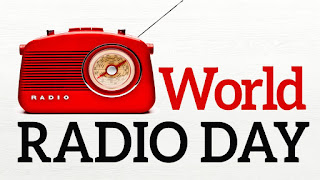World Radio Day
“More than ever, we need this universal humanist medium, vector of freedom. Without radio, the right to information and freedom of expression and, with them, fundamental freedoms would be weakened, as would cultural diversity, since community radio stations are the voices of the voiceless."- Audrey Azoulay, Director-General of UNESCO.
What is your favourite radio programme? The Colgate Cavity Fighters Club aired on RJR many years ago is among my favourite.
The United Nations General Assembly in 2012 designated February 13 as World Radio Day (WRD). Radio is important; in fact some will argue that radio is the most important medium of mass communication in Jamaica and the Caribbean. Jamaica currently has 28 radio stations; some of which are community-based. Radio also serves as a primary means of socialization. There are numerous reasons for the popularity of radio as a mean of disseminating information. The mobility of radio ranks at the top of the reasons for the popularity of radio. Additionally, the interactive nature of radio allows for the listener to call in and communicate with the host which also adds to its popularity. Last but by no means least, the diversity of radio regarding multiple sources of programming content adds to the popularity of radio as a primary means of informing the wider society. In populations with a high degree of individuals who are unable to read and or write the radio plays a critical role in informing, educating and entertaining the society. The radio will be a critical tool in the government’s public education campaign regarding why taking the COVID-19 vaccine is important. Radio is a highly effective means of transmitting information and for this reason is ideally suited for the task. For instance, the use of short wave signals allows radio to transcend geographical boundaries; therefore more people can have access to the information. In times of natural disasters such as a hurricane the role of the radio, especially battery operated radios are critical in keeping the population up to date on matters of national importance. Radio is a powerful medium for celebrating humanity in all its diversity and constitutes a platform for democratic discourse. At the global level, radio remains the most widely consumed medium. Radio has the unique ability to reach out to a diverse audience; in other words radio can shape a society’s experience of variety, stand as an arena for all voices to speak out, be represented and be heard. Radio stations serve diverse communities, offering a wide variety of programs, viewpoints and content, and reflect the diversity of audiences in their organizations and operations. The medium of radio is admired by all generations from older generations who reminisce listening to their radio transistors as a family to the younger generation that has found the charm of radio on the go either in the car or on their mobile devices. Our lives have all been positively impacted by the invention of the radio. On this the tenth anniversary of World Radio Day; the sub-theme of evolution, innovation and connection summarizes the power, the history and journey of radio. This invention has positively impacted humanity over the years. Let us celebrate the power of radio and reaffirm this year’s theme of new world, new radio.
In the words of Hallie Flanagan, the power of radio is not that it speaks to millions, but that it speaks intimately and privately to each one of those millions.
Wayne Campbell is an educator and social commentator with an interest in development policies as they affect culture and or gender issues.
waykam@yahoo.com
@WayneCamo
#WorldRadioDay
#NewWorldNewRadio
©



Mr. Campbell, thanks for informing readers like me of World Radio Day. I never knew such a day was designated for radio. It is unequivocally justifiable. It’s needless to reiterate the value and improve of what you have so eloquently expressed. Cheers to a communication medium that continues to be a nostalgic, meaningful part of our lives and our journey. Happy World Radio Day!
ReplyDelete